This week marked the two-year anniversary of my departure from Boston and arrival in Ethiopia. To honor that milestone, I’m going to reflect on some of the ways I have changed in those two years, on some of the things that have become normal to me here. It’s not that I’d never done many of these things before, but they have never been the norm before.
- Squatting over a hole – As a lover of hiking, camping, and backpacking and as someone who has spent time in Thailand, squatting to poop was not new to me, but squatting over a hole every time I need to go to the bathroom is now my normal. There is one place in town where I can use a western toilet, but the squat has certainly become the norm. I’ve gotten comfortable enough in the squatting position that one morning I almost fell back asleep while squatting.
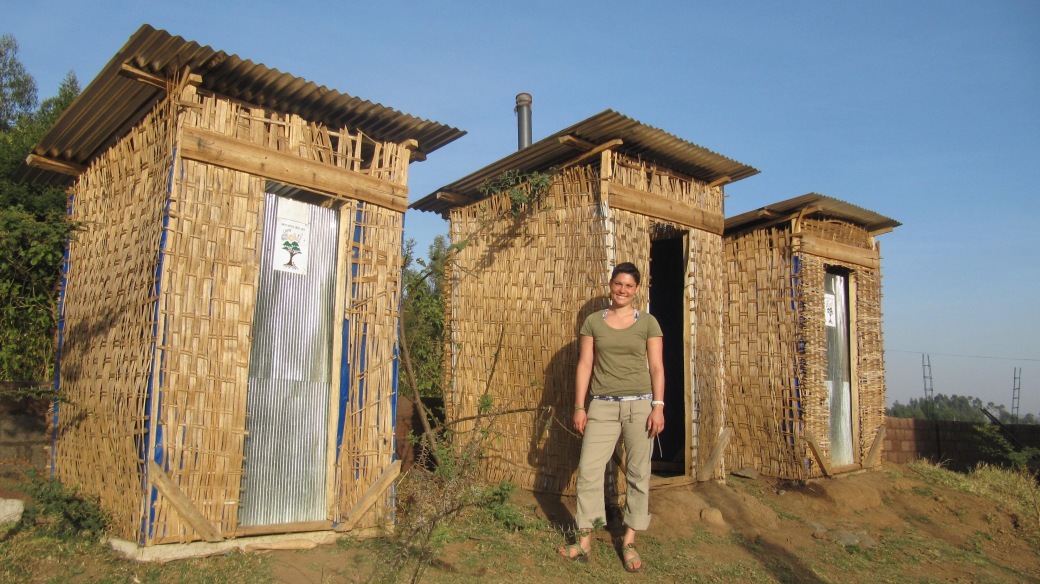
Posing in front of the composting shint bets (bathrooms) we made for summer camp
- Eating with my hands – Again, not something I’d never done, but now all my meals involve injera as a utensil and eating at other people’s houses involve someone bringing a pitcher and basin around before meals to wash everyone’s hands (sometimes the water is even warm, which is lovely). This happens again at the end of the meal, when everyone’s hands are covered in food.
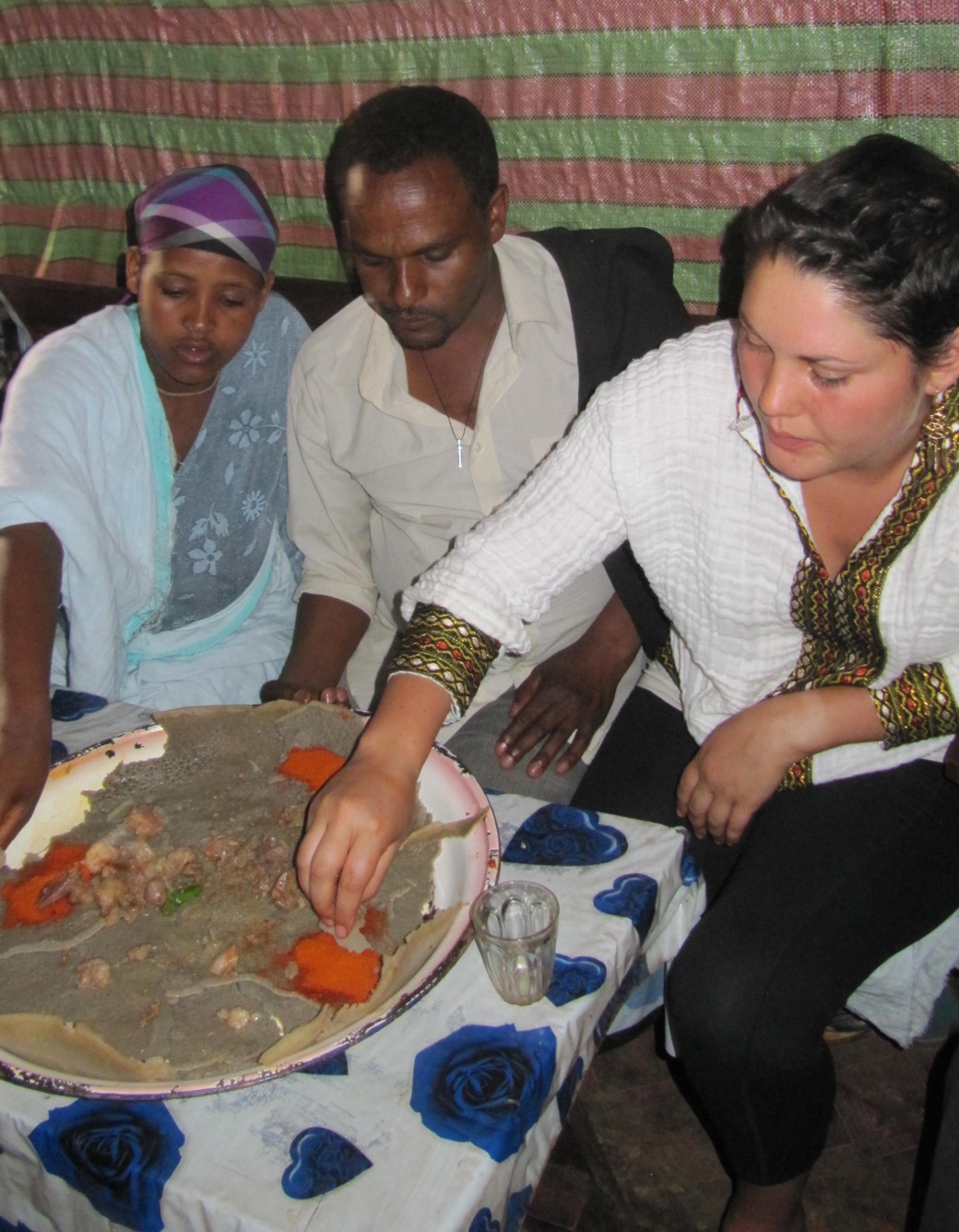
Eating t’ibs (meat) with mitmita (spice mix) with injera off a communal plate at a holiday celebration – they go so fast that it’s hard to capture a full plate
- Doing yoga – Yoga was one of those practices I had wanted to get into for years. It always seemed like an expensive hobby for those really thin girls who carried their yoga mats across campus with them. Soon after arriving here, I realized a yoga mat was going to be essential to my wellbeing here, as it would provide a clean(ish), comfortable space for exercise in my tiny house that rains debris from the ceiling. I ordered one and had my mom send it to me (Thanks, Mom!) and, in one of the many media exchanges I’ve done with fellow volunteer, got a bunch of yoga videos and podcasts. I now had everything I needed to do yoga. I am pleased to announce that it is now a regular practice.
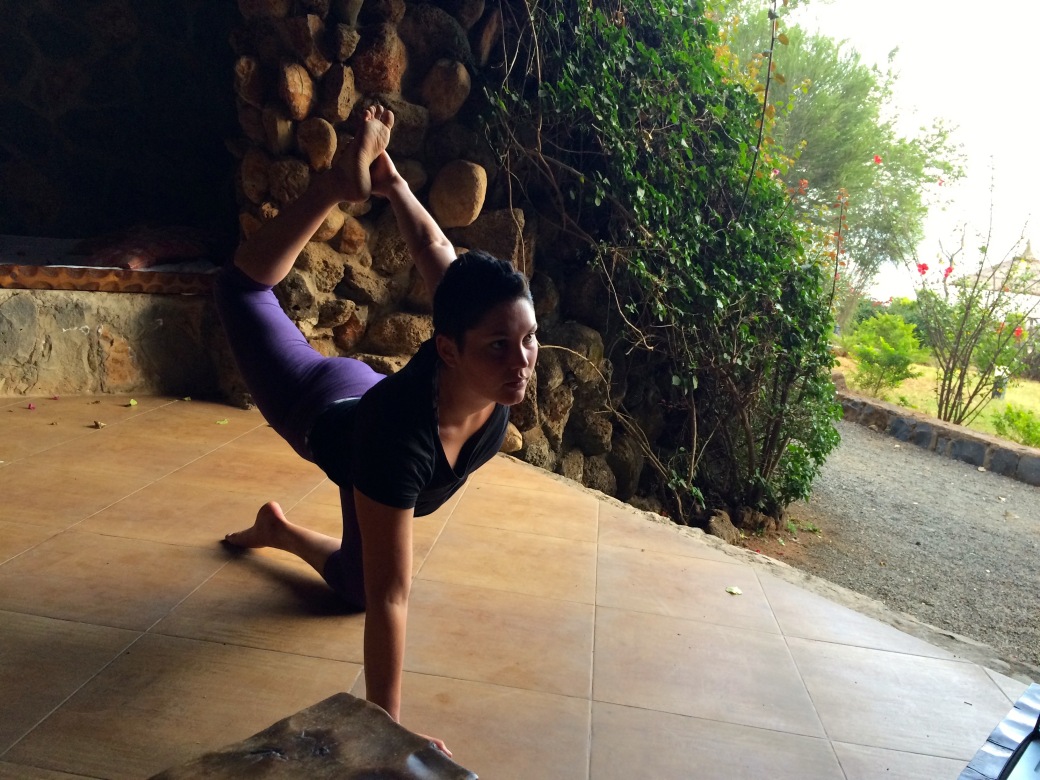
Lakeside morning yoga in Bahir Dar
- Checking to see if there’s power first thing when I get home – In the states everyone knows when the power is out and the entire next day/week is spent asking one another if their power was out too, for how long, what they did, etc. Here it is normal for the power to go out daily, be it for a few minutes or a few hours. The first thing I do when I walk into my house is to check if the light on my power cord is on, indicating power. I keep my headlamp accessible, candles set up, and my external battery (Thanks, Sam) charged.
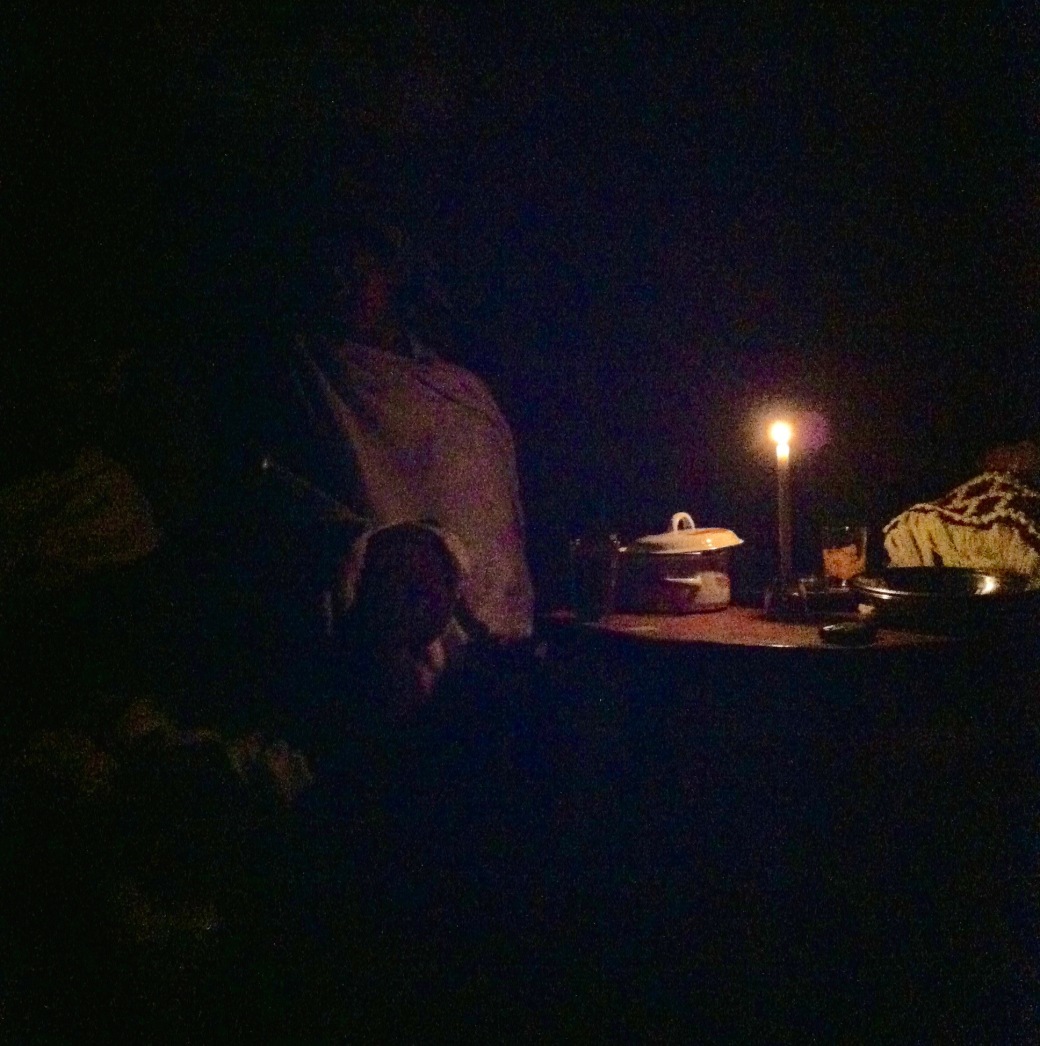
No power, no problem – dinner goes on by candlelight when the power goes out
- Getting my water from outside my house and filtering all drinking water – Again, aside from camping, this is the first time that having to retrieve and filter water has been the norm. I have a tap in my compound, about 25 meters from my door. Like electricity, the water is often off. When this is the case, I get my water from the well next to the tap. Once I fill my water bucket and carry it back to my house, I add bleach, let it sit for 30 minutes, and then fill up my Peace Corps-issued water filter, which is a large, double-bucket system. I have to make sure my water bottle is full before I leave the house. Sometimes I even come home in the middle of the day to refill my water bottle, assuming I don’t want to buy bottled water.
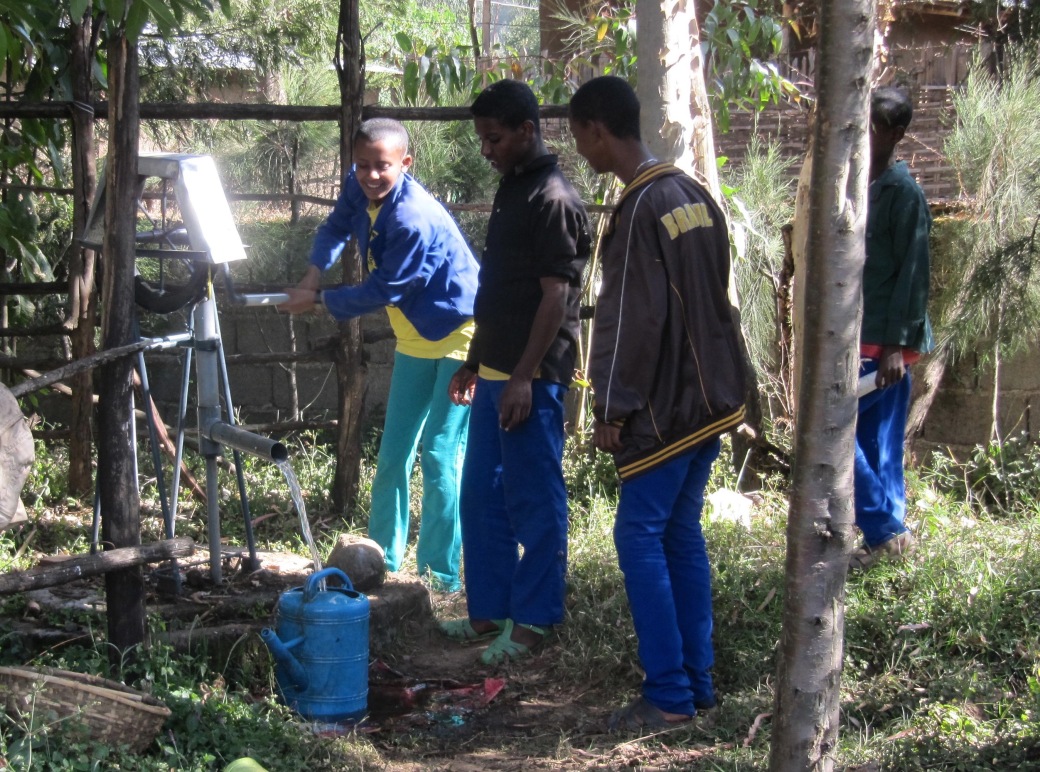
Environment Club students getting water from the crank well to water their compost
- Getting my shoes shined – I’ve certainly never lived in a place where people from so many demographics of the population get their shoes shined on such a regular basis. There are at least four shoe shine stations along the 1 km section of road that runs through my small town. It costs around 4 birr ($0.20) to get your shoes shined.
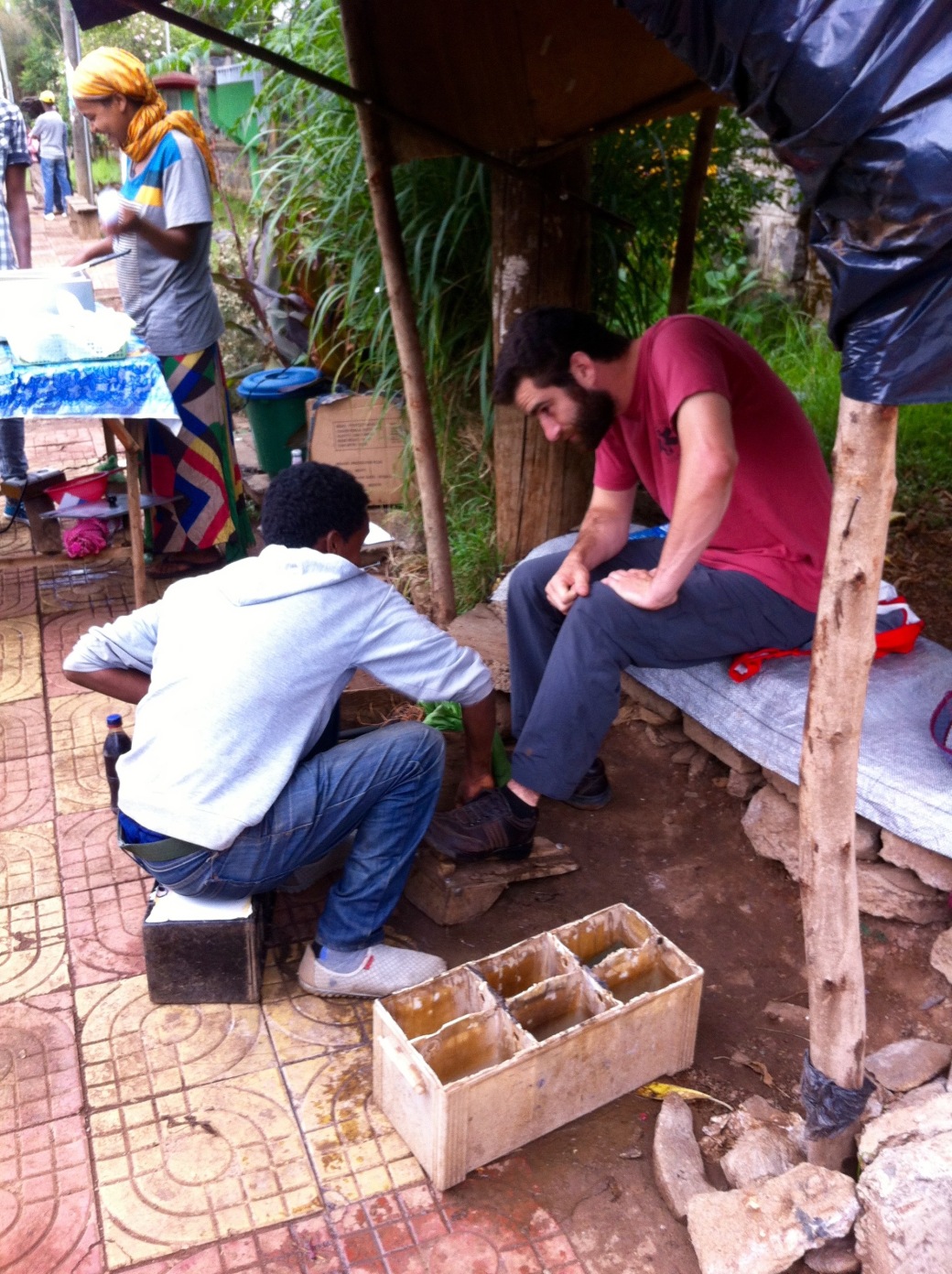
My friend Oren getting his shoes shined during his visit to Bahir Dar
- Walking down the street with livestock – Grazing lands are not fenced off here in Ethiopia. Cattle, sheep, goats, and donkeys walk the streets and chickens seem to wander wherever they please. These herds are usually followed by a man, or often a young boy, with a stick. Cars have to stop to let livestock pass. Sometimes a stubborn horse will hold his ground in the middle of the street and cars will have to go around him. I’ve gotten used to walking around, and through, herds of cattle on my way to the market or home at night.
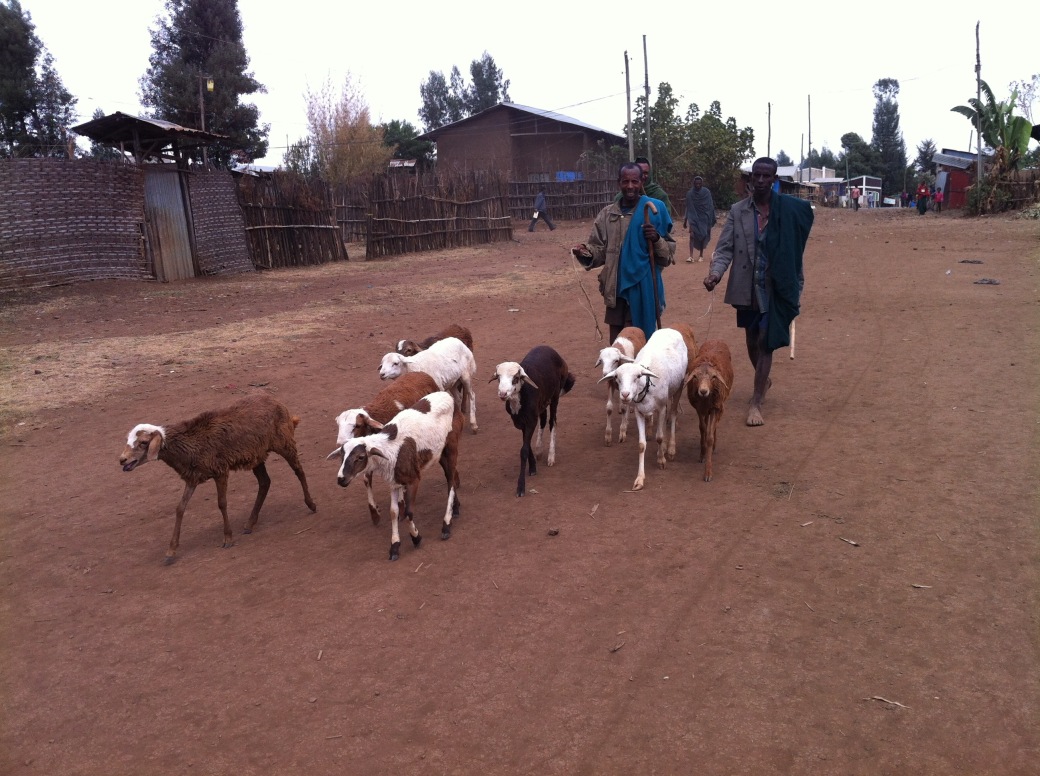
A man walking with his friend and his herd
- Only eating fresh bread – I have been introduced to the wonder that is freshly baked bread. Before buying bread, one piece at a time, I ask if it is fresh. If not, I go on to the next dabo bet (bread house). There are three kinds of bread available in my town – ambasha, wuha dabo, and normal dabo. Fresh ambasha is my favorite. It is baked in large rounds on the oven used to make injera and served in giant pizza slice-shaped pieces. It is 3 birr ($0.15) for a piece of bread that will provide me 2-3 servings. After the first day, I always toast it on my frying pan. Wuha dabo is a giant roll of steamed bread, reminiscent of Chinese steamed buns, and also 3 birr for a piece that will make 2 sandwiches. The last (pictured below) is the most common. It is still incredible when hot out of the oven, but less so than the two other types.
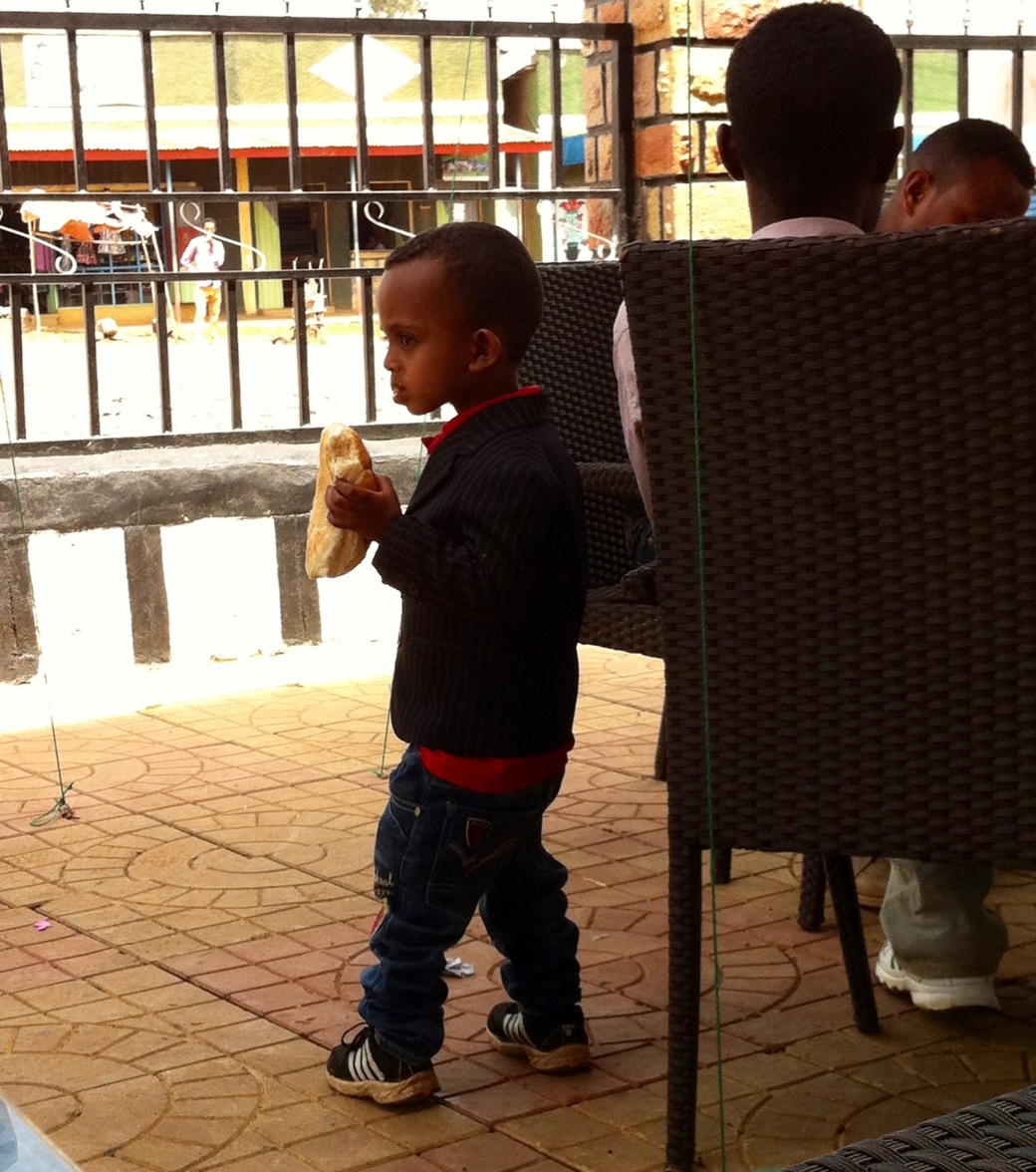
This small boy eats the standard Ethiopian breakfast, a piece of bread the size of his head and a 100 ml cup of tea with 1/3 inch of sugar in it
- Buying fresh produce and eggs twice a week – With no grocery stores in town at which to buy my food, I plan my week around going to market on Tuesdays and Saturdays, which are Addis Kidam’s market day. After two years, I’ve gotten market days down to a science, even in the chaotic bustle that is my market. I buy carrots, beets, tomatoes, and ginger once a week, fruit, eggs, and green twice a week, and onions, garlic, and spices less often. I buy two bunches of greens on Tuesdays and one on Saturdays.
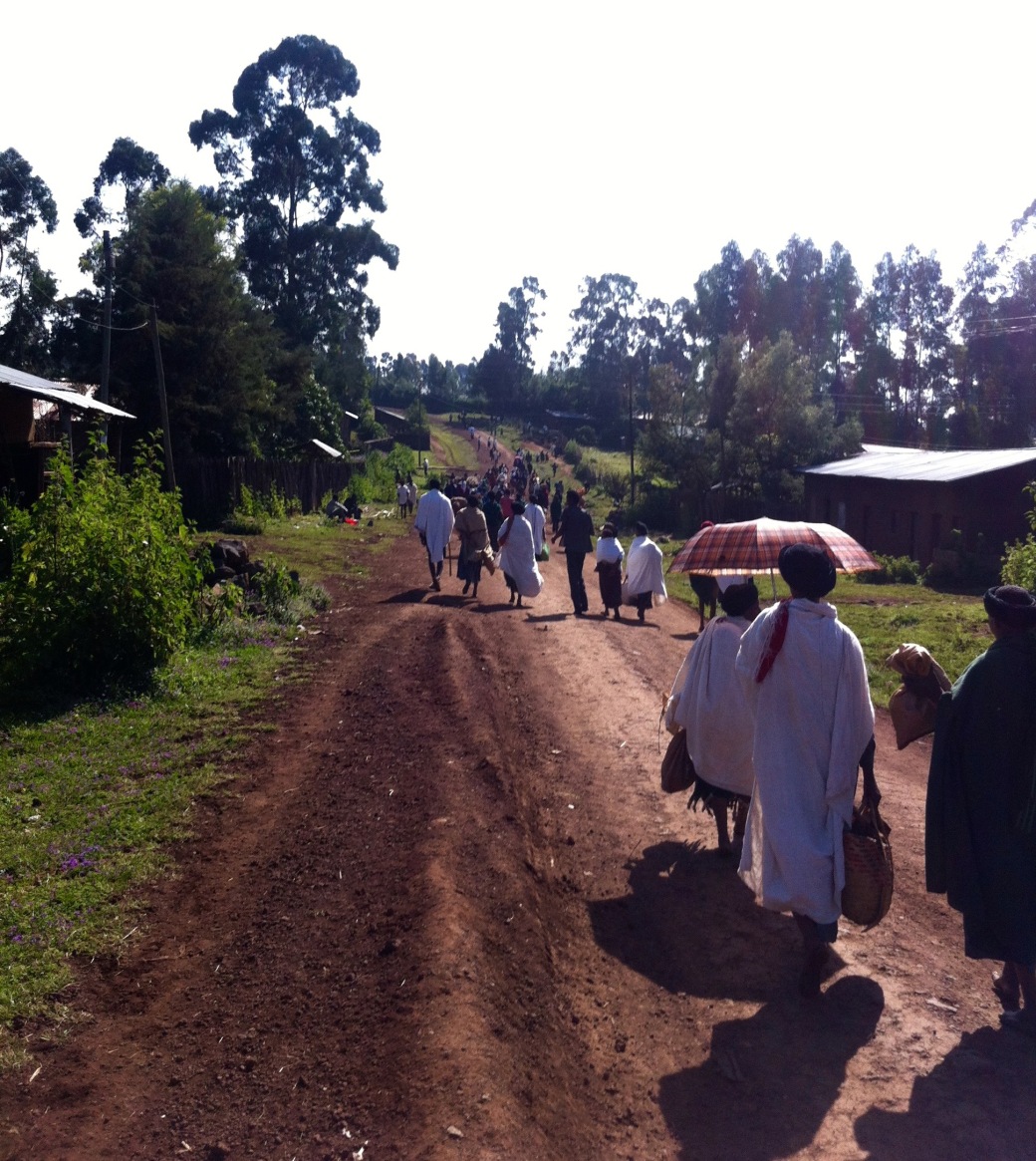
The walk to market
- Watching animals be butchered – Having been in Ethiopia now for ten major holidays and numerous other celebrations, I’ve become accustomed to seeing animals be blessed and then killed, often in the entry way to people’s houses (yes, inside), and then taken outside to be butchered. On such occasions I’m fed meat just minutes after the animal was killed. No refrigerator section, Saran wrapped meat for me over here.
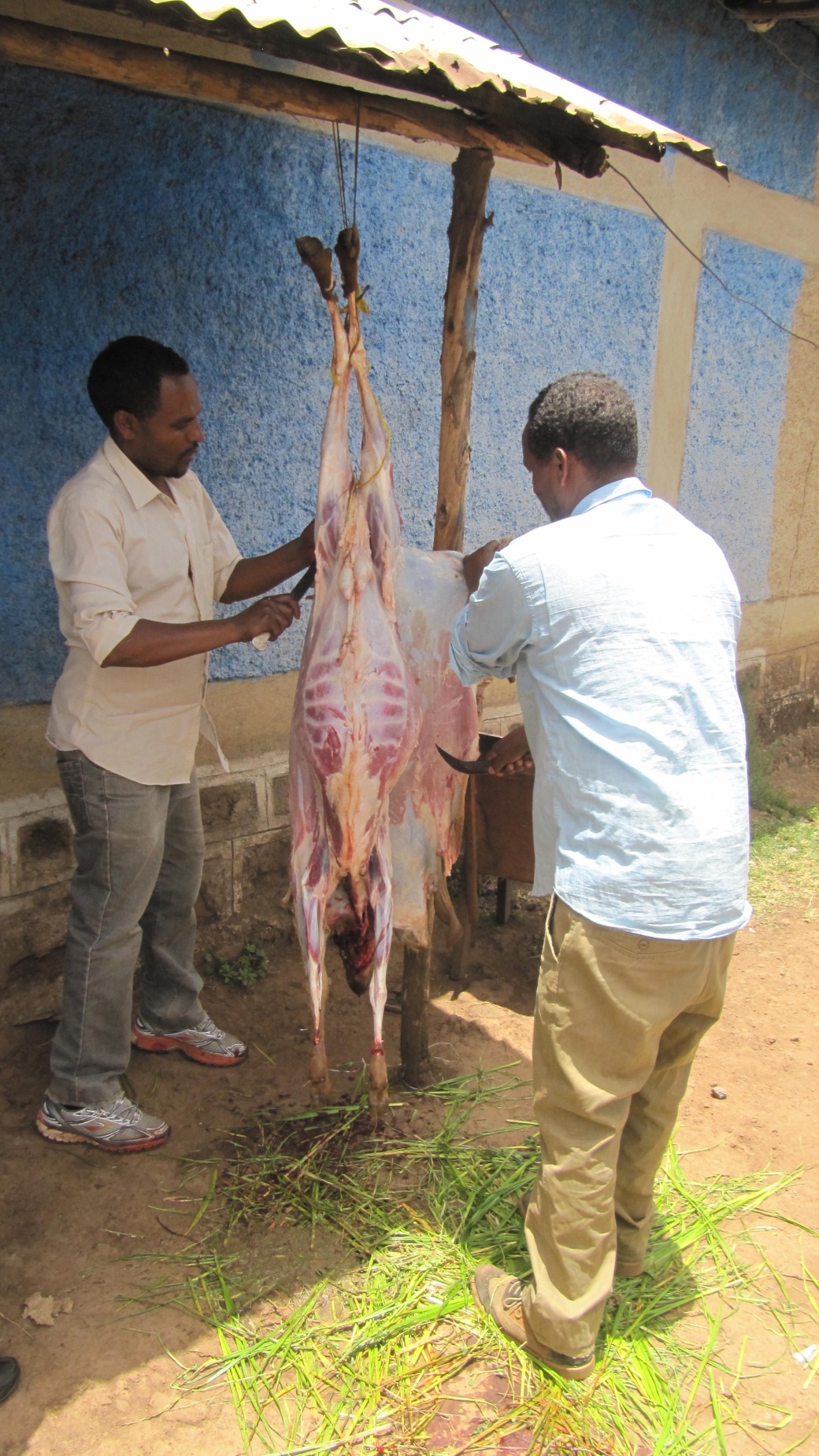
The men of the house butchering the sheep on Faskia (Ethiopian Orthodox Easter)
- Having and wearing a housedress – I can safely say I’ve never owned a muumuu before coming to Ethiopia. In order to fit in with the local women, I got myself the Ethiopian equivalent, called a “shitti” or “pijamah”. I’m not quite as taken with it as other Peace Corps volunteers seem to be. I find that it often chokes me when I sit down, which is why I cut the neckline of mine. But I have been wearing it for frequently recently. Perhaps that means I’m finally integrated.
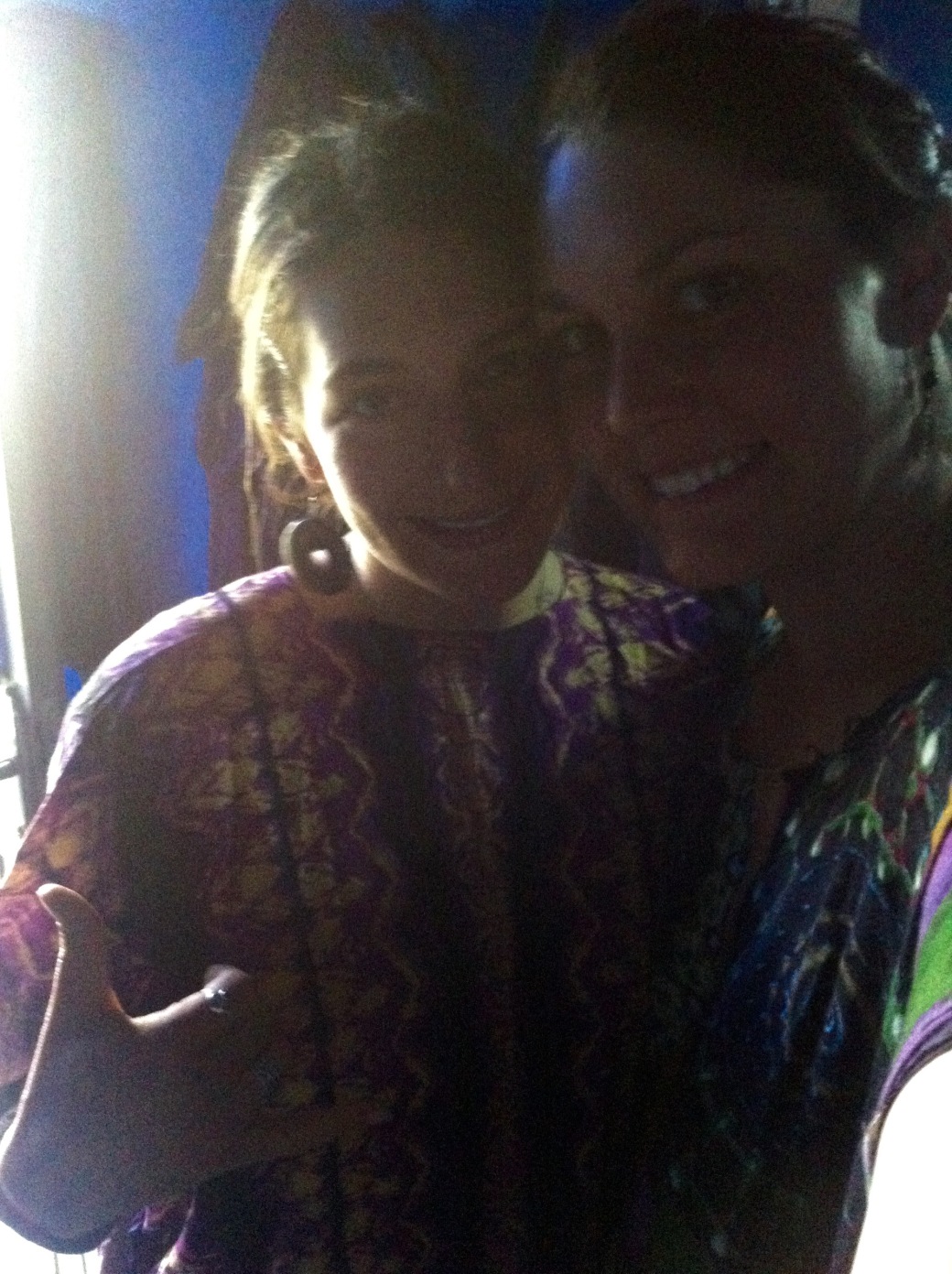
Ali and me in our shitti during her visit
- Lighting incense – Incense is a part of all coffee ceremonies in Ethiopia. And coffee is almost never served without a ceremony, except at “modern” hotels and the one coffee chain in Ethiopia, Kaldi’s, whose green, white, and black logo is suspiciously reminiscent of that of another coffee chain. I light incense not when making coffee, but to cover the seemingly ever present smell of trash being burned.
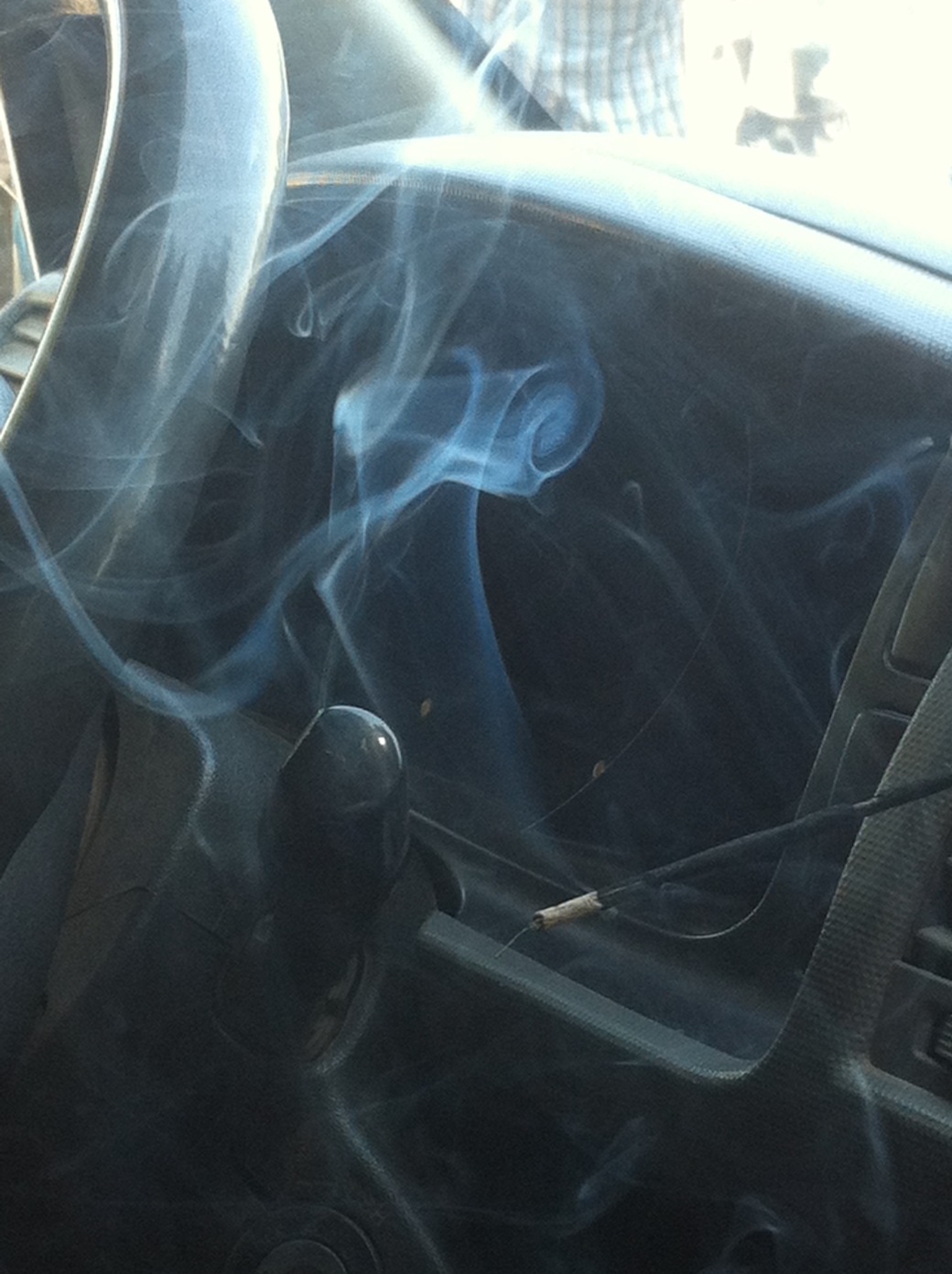
A mini bus driver lights incense in his mini bus while waiting for it to fill with people at the bus station
- Riding on mini buses – Peace Corps is the only foreign organization in Ethiopia that has their employees (or volunteers, since we’re not employees) use public transportation. The U.S. Embassy strongly discourages its employees from riding public buses and mini buses. Some branches, like USAID, even forbid it. But this is my normal – being packed like sardines into a smelly bus on which people often refuse to open the windows, fearing it will give them tuberculosis or hurt their lungs. Each bus has a stock of festils (plastic bags) to be given to people when they throw up, usually after they’ve begun to throw up, hence the incense in the above picture. The first time I rode a mini bus I spent each minute thinking that I couldn’t be on the bus for another minute. These days I take a deep breath, climb in, and put in my headphones. Though I still fight to keep the window closest to me open.
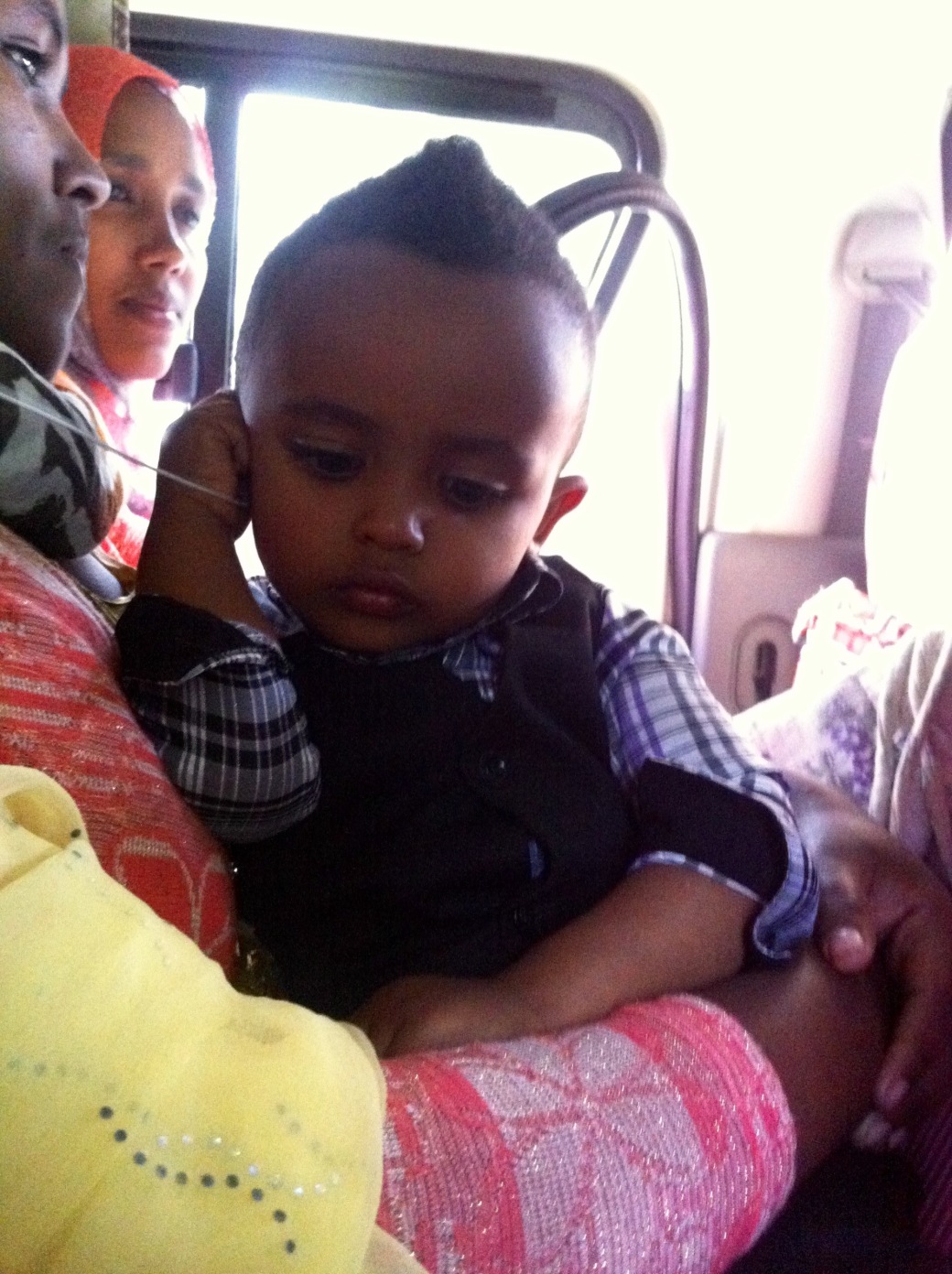
This adorable little boy wanted to know what I was listening to, so he took my headphone out to check it out
- Being watched whenever I’m in public, and sometimes when I’m not – As one of two foreigners living in my town in a country that has never been colonized (though it was occupied by the Italians, twice) I am always being watched. The neighborhood kids try to peek into my yard, and sometimes my house, while the ones who live a bit further run out of their houses when I walk by and scream “ELLEBEE” until I wave. Young men hanging off the side of trucks yell “hello” or other, far less appropriate greetings. Occasionally a well meaning person will say “welcome” as I pass by, 18 months into my stay in Addis Kidam. I often catch people taking pictures of me on their cell phones. Visitors often remark that they feel like celebrities. They’re not wrong. But I now feel empathy for the celebrities who smash cameras. It can be fun for a day or a week, but it is exhausting to live, and I’m only doing it for two years.
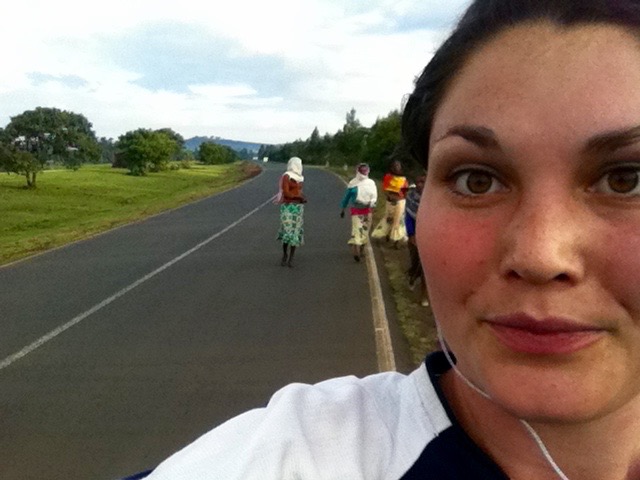
These girls decided to run behind me as I ran, stopping and giggling every time I turned around.
- Having so much time that I don’t know how to fill it – I often finish my daily to-do list, which may only include going to market, by lunch time. This is in stark contrast to my life growing up, when it was school, to sports, to homework, to bed. College added work to that and required willpower for exercise to happen. Trip leading was a 24/7 job. And now some days the only thing I have to do is feed myself, though exercise still requires willpower. I’ve averaged about a book a month here, watched a disgusting amount of tv shows from my external harddrive, rewatched romantic comedies, filled 5 journals, and started going on evening walks that last an hour or two. Sometimes it’s hard to fill the time and I find myself laying on my bed, staring at the ceiling. Other times I sit in the sun outside my house with a book, savoring this period in my life when I can do (basically) whatever I please with my days.
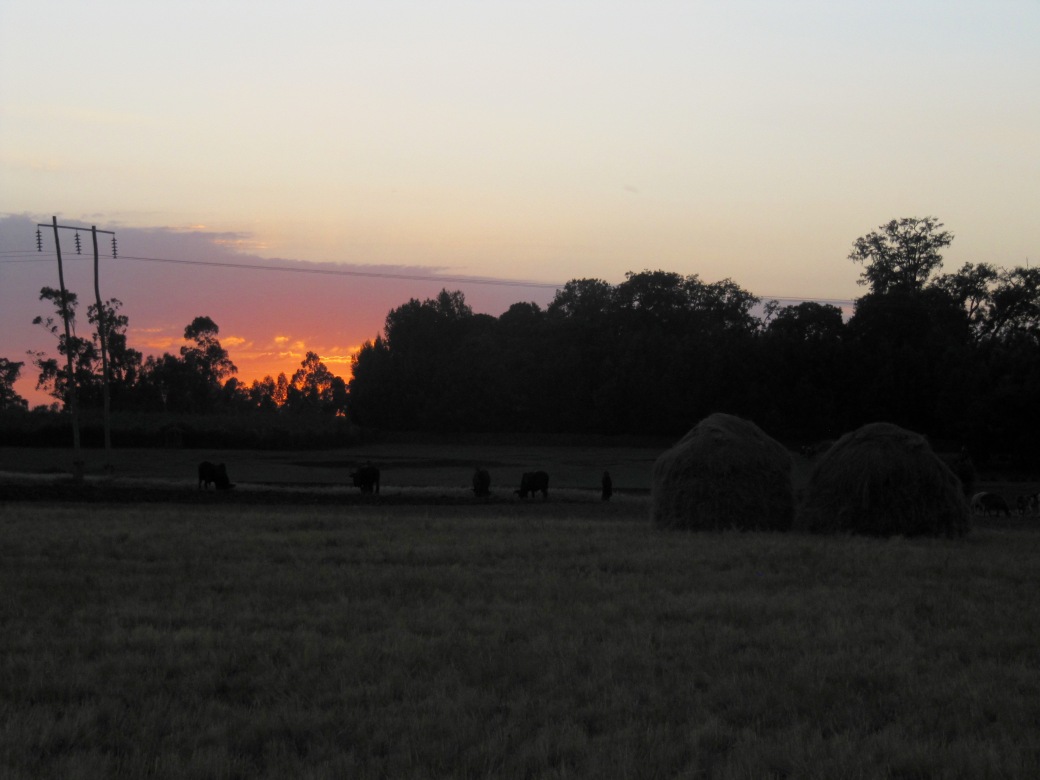
Teff fields and cattle at sunset on one of my evening walks

Pingback: Blog Challenge Responses Round-Up #12 - Blogging Abroad
Photo credit: meat.
LikeLike